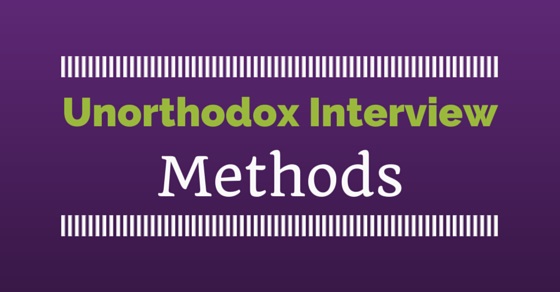There are some major and common techniques which come in easy and handy for both interviewer and interviewees.
But in today’s world, where the country is full of invaded Multi National companies, the old interview techniques have become unorthodox and sound cheesy to the Gen-X Entrepreneurs as well as the professional candidates who are being interviewed.
In the first step of Interview process, the employer and the interviewee converse as if they are friends and they just want to know each other.
In this competitive world, all companies want the best candidates. The nervous tension and the stress parts are nearly vanishing.
The candidates become more confident and sophisticated in their approach and sometimes they over rule the interviewer himself with their extraordinary replies.

The main objective of an interviewer should be to hire the best candidate he possibly can.
So the interview session must focus on the best possible methods to extract the diamond out of coals. The interviewer should follow certain possible steps to overcome the unorthodox techniques:
Tips to Deal with Unorthodox Interview Methods Questions:
1. Motive of the interview:
An Interview is a process designed to get information, and whereabouts from a person’s oral responses to a person’s oral enquiries. It is a planned conversation with a specific purpose between two or more persons.
Inter-view in Latin means to “view each other”. There are two persons involved-one who ask the questions i.e. the interviewer and another who answers the questions who is called interviewee.
Interview, in basic sense is conducted when the interviewer or the employer tries to size up an application for the job.
2. Necessity of Face to face meetings:
Generally, different types of organizations arrange for different types of interviews depending upon their purpose and targets, to extract information through discussion and observation of the interviewer.
By getting an opportunity to meet in person for approximately half and hour session, the interviewer observes the candidate, his body language, his nervous tension and stress if any.
With his eye to eye contact, he can judge whether the candidate is suitable for a new place and new environment. The interviewer is already a part of organization and he knows the whereabouts of the company and its work culture.
He can very well make an estimate that whether this particular candidate can be a part of the work culture already existing in the organization.
3. 21st century needs:
Interview methods are converting their form. Unconventional and free style and unpredictable questioning methods are being followed of mixed orientation, behavior, technical know how and knowledge.
4. Jot down your needs:
 First thing first. The employer should understand what basic things he aspires in the candidate of the respective position.
First thing first. The employer should understand what basic things he aspires in the candidate of the respective position.
On what scale of experience and qualification, can he fix a candidate for the required position. The employer needs to identify the success benchmark he requires in that position.
Now, the employer needs are not confined to only filling up the vacancy, but he is now aspiring for aspects which will make his business move into new streamlines.
He wants a person with advanced technical knowledge so that his business can grab the coming changes through the selected candidate in an easy fashion.
5. Determine the ways by which an employer will find the candidate:
Once it is decided that you need an outstanding performer, you need to identify the ways and benchmarks through which you shall be screening the candidates.
Set up one thing in your minds that you don’t want a best academic qualified or a best professionally qualified candidate instead you want a perfect candidate, like an all rounder.
This selection will include certifications, achievements, references or even spot testing programs. You need to have a person with a right attitude and right personalities, to grasp the work culture at one go.
6. Give a thorough explanation to the candidates regarding the process:
Attendees need to know the exact process of interview with the session wise details, interviewer name, the level of authority, the requirements he is having about the candidate etc.
The candidate should also be well versed with the job profile and the monetary benefits. No hidden surprises or tricks of any sort shall be entertained at the time of conducting the interview.
The candidate’s first day on job start when you give them a call for the interview, so the hirers need to be very considerate and thoughtful in assigning them the requirements.
7. Read and study the resume before hand:
Often the interviewers take a few minutes to just give a fair glance at the resume before calling the candidate for interview. They do not feel the need to read it beforehand.
Now, if the employer has not done any homework of reading the resume and asking questions according to his area of expertise, he will not be able to know much about the candidate which is actually required for the profile.
8. Frame questions on his resume:
Resume plays a great role in the interview session. All the achievements and experiences along with professional and academic qualifications are present in the resume.
Once you read a resume, you can get an idea before hand of the IQ level of the candidate.
You can yourself judge what could have been his achievements and accomplishments and when he is there for a face to face conversation, you can ask him to throw light on the already mentioned accomplishments and the personal experience and satisfaction attached to the candidate in the respective situations.
9. Look beyond facts and figures:
The goal of an employer should be to know as much of the candidate as he can, not restricting his expertise to passing percentages and the number of awards and achievements.
A grade C student can be found of expert knowledge and experience in some other area where a grade A student cannot handle.
So, the employer needs to look beyond the facts and figures at the time of filtering the candidates, so that he can assign the right job to the right man.
10. Note the references:
 While conversing with the candidate about his family and personal background, the employer shall make a note of the references he is attached to. These notes can help you know much about the candidate before as well as after the interview.
While conversing with the candidate about his family and personal background, the employer shall make a note of the references he is attached to. These notes can help you know much about the candidate before as well as after the interview.
11. Contact the references:
Over and above the reference list provided by the candidate, try to contact someone who knows the candidate-like a social media search or a friend from his list.
Candidates will always provide a hand picked references, but it is your duty to use your networking abilities to determine the whereabouts of the candidates.
12. Ranking candidates after interview sessions:
Just a half hour meeting may not allow you to get full particulars about the candidate. It should be framed in a better fashion, like by fixing another meeting or two, a few lunches with the selected candidates or even a social gathering and discussion where he can open up and be himself.
From these aspects you need to know the habits and attributes of the members.
13. Stress Interviews:
Managers conduct stress interviews to judge the pressure taking capacity of the candidates.
It so happens that one of the manager creates a situation of unpleasant manner or he behaves very rudely just to create intense stress and unusual sudden change in behavior situations.
All the other interviewers just watch the reactions of the candidate. Other than this, questions may be set up for a stress interview in regard to extreme situations.
It is conducted to see that if by chances certain adverse situations come through the organization, then what shall be the steps taken by the candidate and how he shall manage the situations with leadership qualities and calm environment.
Some stress type situation like, work overload, multi tasking at the same time etc.
14. Formal discussion, and not interrogation:
When two highly qualified persons are sitting across the table for a fruitful discussion, the conversation should be pleasant and in a polite manner.
Both the interviewer and the interviewee are unknown to each other, so no one has the personal right to interrogate about their personal lives.
Instead, they should give each other an area of respect where the other one opens up for self analysis.
15. Be firm and slow:
The employer needs to understand the level of stress the interviewee is going through at present and he should design a room for him to breathe after each response. This is beneficial for both the employer and the employee.
The employer gets a chance to ask thoughtful questions and the employee gets a chance to be comfortable and speak more freely.
16. Listen to the conversation:
 After asking the questions to the candidate, give him attention to make him realize that you are actually interested and listening to his answers.
After asking the questions to the candidate, give him attention to make him realize that you are actually interested and listening to his answers.
Make him realize that the employer is not only asking questions, but also listening to his answers.
17. Proper presentation and understanding of the questions asked:
Often interviewees do not understand the questions, or even if they understand and start in a right way, they suddenly change the track and answer in a different perspective on the current question.
They try to fill the silence with any amount of experience they are having, without realizing the relevance of answering. In this case, the employer should listen to him slowly.
18. Learn about the interviewee:
It is very obvious that the interviewee shall behave at his best when confronted with you. But to know his actual whereabouts when they are not in am impressing mood, you should keep a check on the candidates from the time they enter into your organization and communicate with the security, or the receptionist when they are told to wait, or when the group of candidates discuss when waiting in the lobby among themselves and each other.
A jerk in the lobby will always be a jerk in the job nevertheless he was the most impressive character at the time of interviewing.
19. Be instant to ask follow up questions:
The most interesting and truthful answers comes on asking follow up questions on the current topic of discussion.
A when or a why after an initial answer makes the exposure more clear and confident. The turning points of the situations can be revealed of the candidates’ past.
20. Answer the questions and doubts of the candidate:
Top rankers are scrutinizing your company profile, company history and background and deciding whether they want to work in your company or not. They know that since they are high profile candidates, they will get calls from a hell lot of companies.
So, they need to screen which is the best for them selves. It is suggested to give them time and make them learn about your recent growth prospects and expansion. Be open to the questions asked by the candidates.
21. Never sell your company:
Just because you want a particular attendee as your employee, you should not try to sell your company prospects and should not let out the secret projects to any one.
A great candidate will automatically trust your privacy and confidentiality once you let out a word of belief.
Let the candidate realize whether the opportunity coming to him is great enough so that he can be a fit to that position.
22. Always make the candidates familiar with the next step:
 Always describe the next process and the next meeting at the end of one session. Explain your planning’s and timings before hand so that the candidate gets his time to prepare for the next meeting. It is better to tell them before they ask.
Always describe the next process and the next meeting at the end of one session. Explain your planning’s and timings before hand so that the candidate gets his time to prepare for the next meeting. It is better to tell them before they ask.
This shows an amount of consideration for the candidate who feels that his efforts were worth it.
23. Compatibility with the interviewee:
Interviewees are the person who pay the highest regards to your business by placing a desire to working in your company by spending more time with you and your company than he would have spent with his family or friends.
It would be pretty rude to avoid them when your work is done.
24. Conduct a second round of interview:
Even if you are sure of the candidate selection, just give a second round meeting to check whether the prospects of the selection have been the same. Clear the minute doubts and take one extra step to do so.
Use your experience in selecting the candidates. Even candidates see a second meeting in an optimistic way and they don’t mind attending it.
25. Basic proper courtesy is expected:
A common courtesy in regard to the interviewee for the results or responses is incentive enough for future harmonious relations. A business reason may also arise in future which you might not be aware of present.
At least, inform the candidates at the time of closure through any communicable means-be it email or telephone or just a simple SMS.
26. Awaiting Results:
Interviewees have an expectation that if they are not selected, they shall be informed about the loopholes.
Whether they were seriously interviewed or not, it is the courtesy of the company to inform them about the closure results and close the loop with them in a polite way.
You should be excited when you reveal the best candidates after passing through all the process. The selected candidate is the one who is filtered because of his best qualities and an all rounder attitude.
To make proper screening, it is very essential that you use the right interview methods and right type of presentations according to the changing scenario. Only then can you expect a long term contract with the selected candidate as he will have a job satisfaction as well as you will be satisfied in giving him the required exposure in the dynamic corporate world.




































